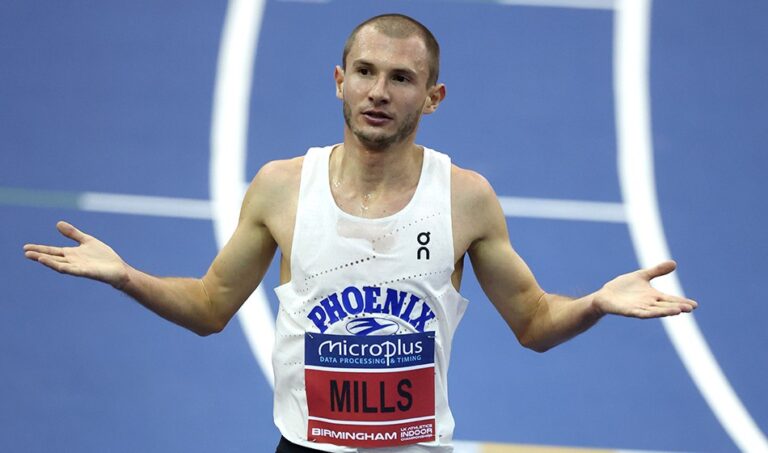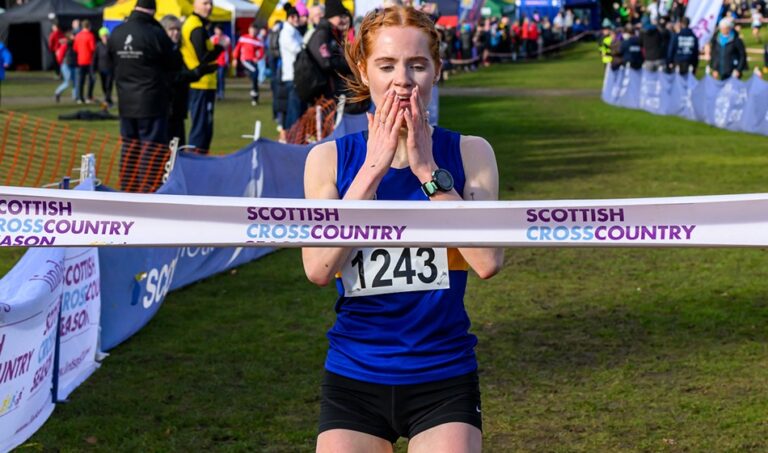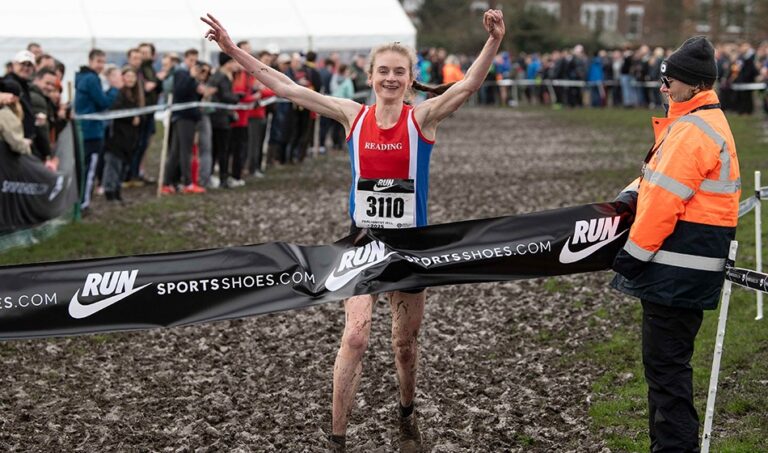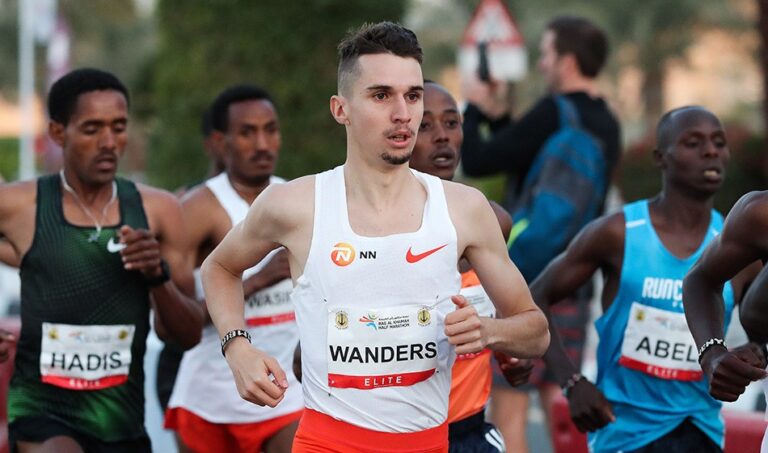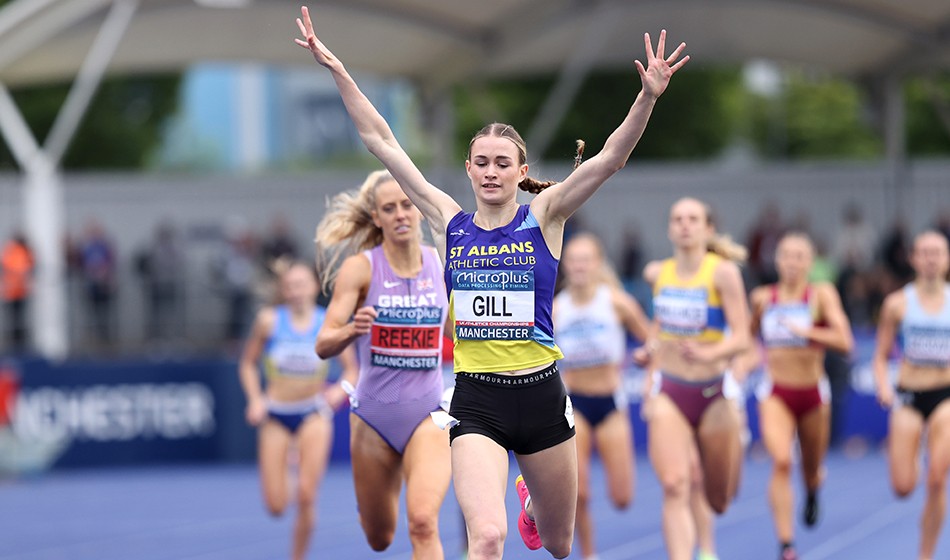
The 17-year-old exceeded expectations in 2024 by reaching the Olympics and explains why she wants to keep having fun on the track for as long as possible
Walking through the curtains and on to the purple track at the Stade de France is a feeling that Phoebe Gill will never forget. Staring into the vastness of the arena and about to tackle the biggest race of her life, the 17-year-old spared a glance at the thousands of people stacked up all around her.
“It was an indescribable thing,” she says. “On the start line of the [800m] heats, I almost teared up when I saw my face on the big screen. I was so overwhelmed and just so proud of myself that I’d made the Olympics.”
It was an understandable reaction, given that she was the youngest British track athlete to compete at the Games in 40 years, but Gill is blessed with the maturity of someone twice her age and she soon switched back to focusing on the job in hand.
After taking a few deep breaths and a dose of self-talk, she set off over two laps and soon began to comprehend the magnitude of the occasion.
With the top three going through automatically, Gill sat third as the halfway mark was reached in a speedy 57.6. At 600m she was fourth but mustered all the strength and willpower that had got her to the Paris startline in the first place, producing a fine closing 200m to secure her semi-final spot.
Phoebe Gill (Getty)
The St Albans AC athlete went on to finish fourth at the next stage, just missing on the final, and after that race the accumulation of everything that had built up over the previous months came to a head. The tears flowed.
“I was proud of myself to cope with the pressure and feeling of an Olympics,” she says. “When you’re going on to the start line, you don’t want to focus on the noise or people and you’re blocking everything out. However, after the race you take everything in. That was such an incredible feeling.
“You know, it’s funny. The Olympics is the pinnacle of athletics but I still couldn’t comprehend how big it actually was. Paris was decorated with so many banners and each country had their own building in the village. It was very easy to get exhausted before even racing. Nothing prepared me for that, even when speaking to athletes about their experiences.
“In the end, I did everything that I wanted to at the Games. I didn’t care about personal bests, getting to the final or a medal, it was just about the experience.”

Natoya Goule leads with Phoebe Gill (left) (Getty)
And what an experience it was. This has been a truly unforgettable year for this emerging talent, capped off by being voted AW’s British under-20 female athlete of 2024.
“This season I learnt a lot,” says Gill. “There was a lot of mental pressure with the new challenge of tackling senior racing but I’m very proud of myself and how I handled it. This award means a lot and it shows the hard work has paid off.
“Looking back to January, I did not think that I’d be in the position that I’m in now. I thought my first Olympics would come at LA 2028.”
Gill had been making waves on the junior scene for a while and won the 800m title at the Commonwealth Youth Games in 2023, but it was on May 11, at the Belfast Irish Milers Meet, when everything changed for her thanks to a run of 1:57.86 on the Mary Peters track that broke Marion Geissler-Hübner’s 45-year-old European under-18 record.
Not only had she decimated her personal best by almost four seconds but she had also gone inside the Olympic 800m qualification standard of 1:59.30.
“I knew that the training was going well but I didn’t expect to go that quickly in the first race of the season,” she says. “It was just a weird feeling because it was an Olympic year and I felt like a lot of it was lucky!
“I remember at the Youth Commonwealth Games I finally dipped under 2:03 [2:02:30] and it felt so hard to do that. The fact that I was able to go under two minutes that quickly this season was so strange to me and I was really perplexed it happened. Looking back, though, I did train really hard during the winter and maybe it shouldn’t have been that much of a shock.”

Phoebe Gill (James Rhodes)
The attention that followed was substantial. All of a sudden, Gill was firmly in the conversation for a spot on the Olympic team and very much in the spotlight at the UK Championships, which doubled up as the trials for the Games. Employing different tactics to her usual first-lap blitz, she took her chance and became senior British 800m champion, producing a negative split to see off Jemma Reekie. Unlike her “nothing to lose attitude” at the Olympics, however, Gill’s mindset in Manchester was very different.
“I felt so much pressure to try and get to the Games,” she says. “That wasn’t just pressure from myself but also from the media. I can understand why there was an attraction around ‘Phoebe Gill goes to the Olympics’.
“I wasn’t in the best mental space at the time and I wasn’t sure if I’d be able to pull it off, so when I actually crossed the line first and I could call myself an Olympian, it was the highest moment of my life. The commentator said to me: ‘How did it feel?’ and I couldn’t even put it into words. I still struggle to do that.”

Phoebe Gill (Keith McClure)
To cope with that pressure of trying to make the Olympic team, Gill put all of her thoughts into a journal. She also reveals how mental exercises, established by her long-time coach Deborah Steer when she was 12 years old, helped enormously.
“The pie chart is a big one,” she says. “At the time I was struggling with cross-country races and dropping out of them because I felt I couldn’t do it. I felt that every race was like the end of the world. Deborah really put it into perspective.
“She told me to draw everything that was important and put a percentage next to it on the pie chart. It made me realise that running was just a hobby and life moves on, whether you do well or badly. There are so many more important aspects to life like family and friends. I’m Phoebe Gill, I’m not Phoebe the athlete.
“Trying to grasp that perspective was really useful for me this season as I thought: ‘Okay, if I don’t make it to the Olympics, it’s not the end of the world, as I could move on and I’d get other opportunities’. I’ve now learnt so much that I can carry through my athletics career.”
Gill also wants to emphasise the importance of fuelling. She’s now works with a nutritionist and, combined with the strength and conditioning work last winter, her training and subsequent performances have improved considerably.
“It’s very hard for young athletes, especially when we’re developing, to understand how much energy we’re using in what we do,” she says. “I had a massive energy imbalance for years and struggled with the symptoms of RED-S [Relative Energy Deficiency in Sport].
“I now realise how much more awake and energised I feel in sessions by fuelling properly. It’s something I suggest young athletes look into as we see such a high dropout rate amongst athletes in these age groups. A lot of that is to do with RED-S and people not even realising it.”

Phoebe Gill (Getty)
After the Olympics, Gill considered travelling to the World Under-20 Championships in Peru but decided against it. She did, however, race for the club she has been a part of since the age of six in the National Cross Country Relays, anchoring the St Albans side in the under-20 race.
Upon returning from Paris she and Steer received a standing ovation from club members who also formed a tunnel for the pair to walk through.
“It was a very emotional moment as it was everyone I loved in one place cheering for and congratulating me,” she says. “It was very heartwarming for both me and Deborah.
“I hope she doesn’t mind me saying this but she was bawling with tears! Everyone was praising her. I feel bad because they wanted me to do a speech and I’m awful at them!”

Phoebe Gill (Graham Smith)
As for what comes next, Gill’s immediate focus for 2025 is on her education and finishing off her A-level exams – biology, chemistry and maths – in June. The Tokyo World Championships being in September allows breathing space to start her season later. That doesn’t mean she’ll be skimping on training, though.
“I’ve always seen running and training as a break from revision,” she adds. “I make these timetables and in these break slots I put running in, where I can get out and enjoy the fresh air. I did it during my GCSEs and it worked. A-levels are a completely new ball game but I know how to revise so hopefully I should be all right.”
For now, Gill just wants to enjoy the sport. She is not oblivious to the tales of junior athletes who promised much but burned out before reaching their potential. That is not a trap she intends to fall into.
“Being an Olympian is so cool but I want to do so much more than that,” she says. “That’s why me and Deborah are so fixated on enjoying the sport for as long as possible and having fun. When you don’t have fun, that’s when burnout is prime. Running is my safety net and it really just gives me an outlook for everything else in life.”
Teenager Matthew McKenna makes his mark at 800m


